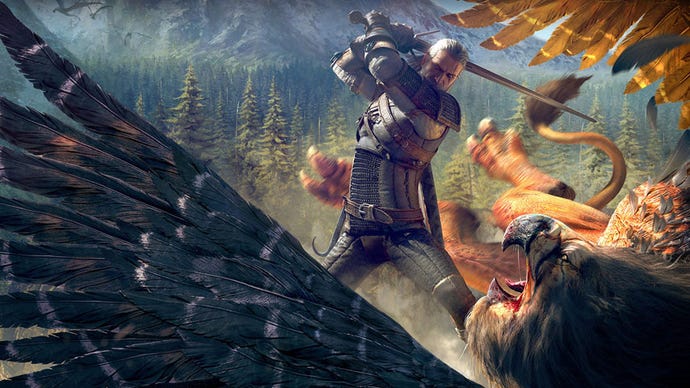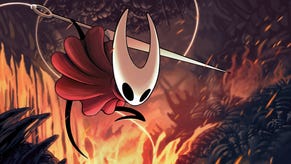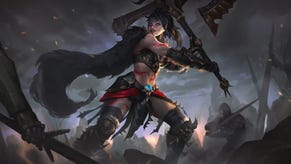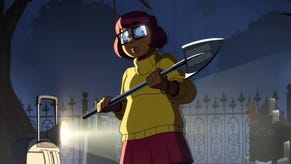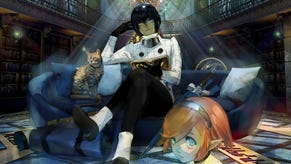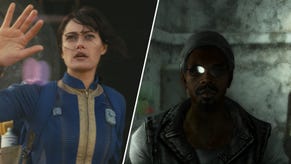The Witcher 3's ending drops the ball, but the epilogue slam dunks
The Witcher 3 ends with a thrilling battle - and a confusing mess of cutscenes. The last minute twists may rankle, but there's a great deal of satisfaction in there for those willing to look at the broader context.
The Witcher 3 is the end of a trilogy and likely the end of CD Projekt RED's adventures with Geralt of Rivia, a figure famous throughout Eastern Europe and increasingly the English-speaking world for a series of rip-roaring fantasy stories by Andrzej Sapkowski.
The books are justifiably celebrated for their subtle but intriguingly unusual take on high fantasy, and the setting is as well known among Polish fantasy readers as Middle-Earth is to their English-speaking equivalents.
Even the most wandering player is aware of who the Big Bad is, and finally getting to meet these foes in person and cut them down is very satisfying. But then it all goes a bit mental, with not one but two plot switcheroos breaking in the cutscenes and dialogue leading up to and closing the final mission.
That the games remix a story and universe already well-known to core fans, that The Witcher 3 closes off a three-game story, and that the vast majority of players never finish video games are all important facts to bear in mind when considering the ending of The Witcher 3: Wild Hunt, which is a bit of a mess, to be brutally frank.
Gameplay-wise, the final few missions pay off. Difficulty escalates rapidly and those who haven't been side questing and upgrading with dedication may need to fall back on older saves to meet the ramping challenge. The last couple of boss fights are especially fine, calling for a careful blend of cautious swordplay and thoughtful equipment and skill stacking.
Although it's easy for the inattentive to forget what's going on in The Witcher 3's politics and fantasy-heavy plot (despite multiple admirably executed exposition recaps), even the most wandering player is aware of who the Big Bad is, and finally getting to meet these foes in person and cut them down is very satisfying. Any attachment you've developed for Geralt and Ciri drives you to put down these relentless enemies once and for all.
But then it all goes a bit mental, with not one but two plot switcheroos breaking in the cutscenes and dialogue leading up to and closing the final mission.
Throughout the whole game, the player has been battling the Wild Hunt. From the opening dream sequence to the final boss, the player knows Eredin and company are trying to hurt Ciri, and they want to stop that.
Having put Eredin down though, we're suddenly told that actually, it was Avallac'h all along. This switch feels weird, not the least because of some clumsy handling of that whole situation in earlier missions. Throughout the game Geralt is mostly mistrustful of Avallac'h, while Yennefer and Ciri assure him the elf sage is trustworthy. In one of the very last missions before the final boss, Yennefer and Ciri suddenly declare they don't trust Avallac'h, while Geralt seems reluctant to believe them. It's all a bit odd and feels like a last minute inclusion to make the sudden painting of Avallac'h as a villain as less predictable and silly than it is.
It doesn't end there, though: having had at most ten minutes of gameplay time with Avallac'h as the villain, Ciri appears and says no, he's not, and she's off to battle the real threat - the White Frost. Who? What?
Regardless of which epilogue mission and ending sequence you view, these last minute twists rob the final missions of their impact and drama. First there's a "surprise" betrayal from an untrusted ally, which is bad enough, but then there's the substitution of a new, unknown villain right at the last moment. Your battle against what you thought were the baddies turns out to have been largely meaningless.
This is an unfortunately common trope in RPG's. Final Fantasy 9 and 10 both did it, as did 8, to a lesser degree. Mass Effect 3 and to a lesser degree the original Mass Effect did it. You spend the whole game (or series) fighting a charismatic bad guy and then you get to the end and they're not really the bad guy after all; there was another power behind the scenes all along - one you've never heard of, and have no reason to care about. All tension dissipates instantly.
Sometimes this is done really well, and feels like a mind blowing pay off to careful seeding throughout the game experience so far. Most of the time, it just feels like a betrayal. Spending a whole game, especially one with the length of an RPG, pursuing a charismatic villain and facing them down at the end may be a little dull (although Final Fantasy 7 begs to differ), but trying to enliven this age old story with last minute twists isn't an effective answer to the problem. It tends to leave players feeling cheated.
One other significantly disappointing aspect of the overall plot is that for all the talk of consequential choices and 36 endings, there are really only three of them, and only seven decision points that effect what ending you see. That would probably be fine if it were not for the fact that the decision points all rush together in the final two acts, which are pretty short.
Moreover, one of the most important decision points rests on your completion of a chain of side quests. There's nothing wrong with that on its own, but the quests in question are very much at odds with what we know of Geralt's character; what we know of the lore of The Witcher; and with what we've been told all along is the goal of the game. If you don't suddenly decide that Geralt will break all his codes about being neutral and assassinate a monarch because a man who hates him asks him to, you can't unlock one of the three endings.
Bit odd, that. It doesn't feel satisfying from a narrative standpoint, because you have to diverge from your set goals and character to achieve them, and it's unpleasant from a game structure standpoint, because it feels like you've been tricked into missing what may be the "best" or "true" ending, if you like to make judgments of that sort.
These two problems - the last minute switcheroo and the ending's dependence on a few late game moments and easily missed sidequests - are particularly disappointing when, elsewhere in the game, there are some really excellent examples of writing, story telling and character. From laugh-out-loud comments from the dry but very funny Geralt, to the touchingly warm and human interactions between Ciri and her adopted father, to the surprisingly nuanced handling of female characters (and a discussion of that, in contrast to some of the more egregious moments of pandering to the teenage boy presumed to live inside of all of us, is something we'll have to have at some stage), it's clear CD Projekt RED has some real narrative chops. To have the team drop the ball at the ending is puzzling, and is especially irritating when you've sunk what may be hundreds of hours in.
Next: Actually, it's not all that bad.
There are mitigating factors, as I said earlier. The reveal of the White Frost as the real threat of the game makes perfect sense to those who are deeply immersed in the lore, either through familiarity with the books or by close study of the three games to date (it is indeed foreshadowed in text materials and other clues throughout Wild Hunt), and since the vast majority of players won't see The Witcher 3's ending, speaking to that group makes a sort of sense, even if other players who make it through are left confused and unsatisfied.
There's also an argument that the "twist" ending puts the game's story so far in a context where the three possible epilogues all feel much more meaningful. Throughout Wild Hunt, we're playing the story of Geralt of Rivia - a man who, first and foremost, wants to protect his friend and adopted daughter from an external threat. He envisions a life for the two of them together when she is free of the threat engendered by her genetics - a life that fulfils the promise they've had so little time together to explore.
Geralt’s story is part of something bigger – something he himself has not focused on, because he’s been single mindedly pursuing his goal. That something bigger is Ciri’s battle with the White Frost, a catastrophic threat not just to Geralt’s world, but to all worlds. Ciri’s story, though we see it only in glimpses, is a much bigger tale with higher stakes than the one we play.
Meanwhile, the final quest and epilogue mission emphasise that Geralt's story is part of something bigger - something he himself has not focused on, because he's been single mindedly pursuing his goal of a happy life with Ciri by his side. That something bigger is Ciri's battle with the White Frost, a catastrophic threat not just to Geralt's world, but to all worlds. Ciri's story, though we see it only in glimpses, is a much bigger tale with higher stakes than the one we play. (Cynically, I wonder if CD Projekt Red is leaving a door open for games starring Ciri in the future?)
It's this sense of one story merely brushing against another, bigger one that helps justify the somewhat disappointing aspects of Wild Hunt's storytelling. Apart from that chain of sidequests, all the decisions you make that effect the ending have to do with Ciri. It's how you shape her character that affects which ending you see - whether she is missing, presumed dead; whether she embarks on a life of adventure; or whether she accepts her biological father's throne and rules the Empire.
Parenting stories are becoming much more common in games now that developers have acknowledged not everybody who plays them is 11 years old (soon we'll show them we're not all white, male and straight, too!) but Wild Hunt stands out from the rest. Instead of appealing to your instincts to protect and teach, it addresses what may be one of the most difficult aspects of raising kids - letting them go. Acknowledging they have an independent existence beyond you.
For Ciri to return from her confrontation with the White Frost, you need to exhibit careful parenting. Ciri is an adult, she, her friends, and the game takes pains to remind you at all times; she is Geralt's equal in many ways. (By the end of the game, she could hand him his arse on a plate, for one). To save Ciri, you must foster her independence; refrain from attempts to shelter and lecture her; treat her as a friend rather than a package to be shuttled from place to place.
Geralt's true importance, then, is not as a slayer of monsters and conquerer of the Wild Hunt, but in the impact he has on a vitally important person - the saviour of the entire multiverse. If Wild Hunt - indeed, the entire Witcher trilogy - were told entirely from Ciri's perspective, Geralt would be a bit player. Important, but not the hero of the hour. Geralt is the hero of his own story, maybe (interesting that one of the taglines is "the world doesn't need a hero, it needs a professional"), but the story of the world is the story of Ciri. However you complete The Witcher 3, the epilogue is all about Ciri, and Geralt's reaction to her fate - not the White Wolf himself.
Video games so rarely manage to tell meaningful stories without ratcheting up the stakes to apocalyptic life or death matters that it's really interesting to see such a prominent video game make an attempt at it; it's something I applaud. It's awesome to see a young woman given such a huge role in a game narrative, too, even if her importance is snuck in via the back door instead of openly celebrated.
One last thing before I stop talking about The Witcher, a subject I can happily nerd about for hours on end, saying both delighted and disappointed things: in my mind, the ending in which Ciri becomes Empress is the best one. Not because she vows to rule benevolently and well over a consolidated empire, something the troubled world setting certainly needs, but because a life lived independently of Geralt fulfils the promise of the secret story premise: that Ciri has her own story beyond Geralt's plans.
To back this up I cite the defeat of the White Frost and thereby the reduced risk of another Conjunction of the Spheres. One of the themes of The Witcher, as hinted at during Wild Hunt, is that the magic and monsters which were introduced from a foreign plane are drying out - along with those few relics of the world's natural magic. The demand for witchers is ebbing; the trial of the Grasses is practiced no more; mages are releasing their fevered grip on politics; peace is coming.
At the end of my Wild Hunt save, Geralt retired from the witcher life, settling down with Yennefer, who considers herself Ciri's adopted mother. The pair of them can finally free themselves from the entanglements of a world which is able to look after itself, and forget the politics and conflict that has embittered and endangered their long relationship.
Saying goodbye to Ciri, a character I had grown to adore, was hard. Standing there in White Orchard with Geralt, watching his face shift oh-so-slightly (CD Projekt Red, your facial animators are gods damned wizards) in that way so familiar to anybody who has had to say goodbye to a dad before either of you wanted to, I burst into tears. But it's not forever, is it? She knows where to find him.
Geralt might be a footnote in the history of Ciri's reign, but he's a touchstone in her life: an endless source of love and strength. That's as big an achievement as putting down any silly old apocalypse.
